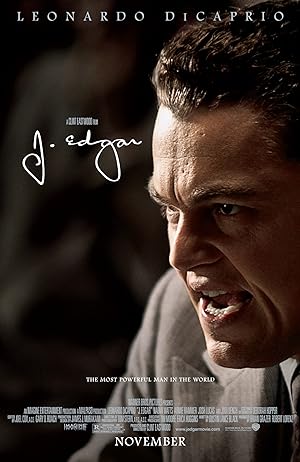Any film that succeeds at making me sympathize with J. Edgar Hoover for even a moment is a good movie. Clint Eastwood’s J. Edgar is predominantly told from Hoover’s point of view as he dictates a book about the FBI’s origins and development of proper criminal science to a series of young male agents. The depicted dictated events are interspersed with Hoover’s personal events at that time and his life at the time of the dictation as he reaches the end of his life and reign.
J. Edgar looks like a black and white film even though it is shot in color. The majority of J. Edgar is told from Hoover’s point of view, but as the movie progresses, certain scenes are then factually depicted and contrasted with his earlier representations. J. Edgar indicts itself by making the viewer question its earlier sympathy and possible admiration. Eastwood’s work, such as Flags of Our Fathers and including J. Edgar, generally shows a conflicted ambiguity about the past-admiring, but doubtful. When Hoover talks about how people disapprove of his methods, but forgot what it was like when terror of bombs and violence dominated American streets and homes, Eastwood is practically screaming an inference to 9-11 and reveres Hoover while not ignoring Hoover’s sins in his blackmail of American leaders and misstep in his attitude towards Civil Rights leaders. J. Edgar walks a tricky tightrope, but it works.
J. Edgar excuses Hoover by delicately alluding to then explicitly depicting Hoover as a closeted homosexual who never sexually acted on his desires, but clearly had a life partner. As J. Edgar progresses, the relationship begins to dominate the film. J. Edgar depicts Hoover as a prisoner of his mother’s lofty ambitions and standards, a paragon of achievement as a nerdy meticulous organizer and a vindictive, egotistical, particular man by nature who eliminates anyone who does not confirm to his image of how things should be (think of the erection of fireplace in his office and where he got the idea). If Hoover was just a nerd, I would have married him in a second. Since it isn’t the only description, I have no idea how Hoover inspired such lifetime devotion, and unfortunately J. Edgar did not help me understand that aspect of his life.
I decided to finally watch The Aviator, J. Edgar and one other notable movie that starred Leonardo DiCaprio in one day to see if he is really as great an actor as I remember, and I watched them in chronological order. The Aviator precedes J. Edgar. Eastwood masks DiCaprio’s baby face through black and white visual style and layers of make up as Hoover gets older whereas DiCaprio uses emotional sternness and weight. DiCaprio nails Hoover’s physicality, and even though there were a few seconds when I noticed that he used similar OCD mannerisms that he used as Hughes in The Aviator, DiCaprio used it judiciously, sparingly and correctly. DiCaprio occupies the right amount of space as a simultaneously powerfully large and emotional tiny man.
J. Edgar is not a joy to watch, but it is a solid movie that is a must see if you’re interested in either FBI, CSI, Hoover or the time period.
Stay In The Know
Join my mailing list to get updates about recent reviews, upcoming speaking engagements, and film news.





